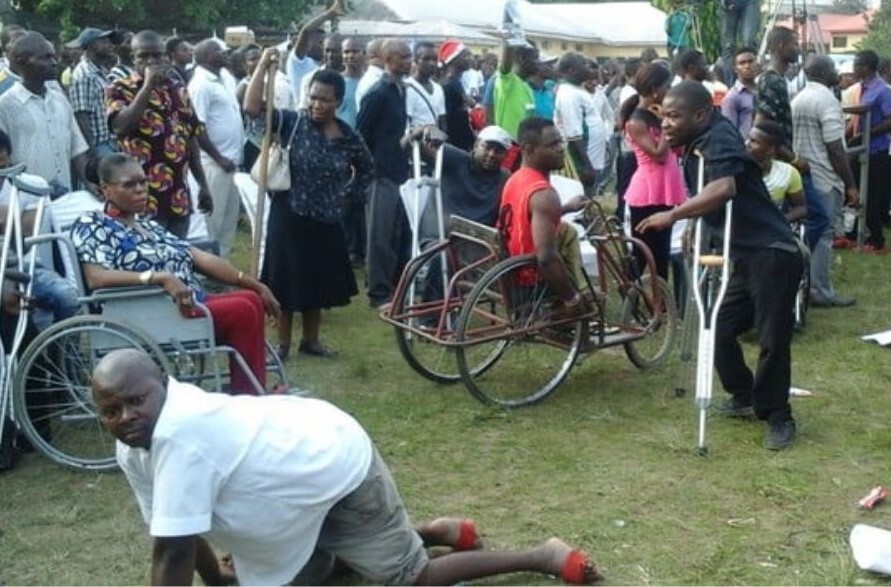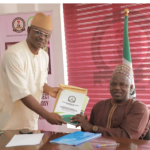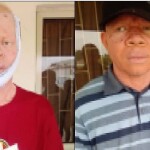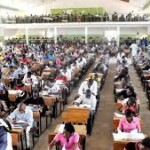Like most other poor Nigerians, majority of the over 30 million people with disabilities usually recede to the outskirts and countryside of major cities and towns across the nation, including Nigeria’s first mega-city, Lagos. Whatever civic life the state or the local government provides them—they make the best of it. And the same government expects the PWDs will carry out their civic responsibilities using the facilities.
So INEC, as the 2023 general elections draw near, expects PWDs will max out the facilities it has provided for them to vote.
The expectation, which is way too unrealistic, has a basis—and it’s not a broad one.
CSOs and other advocacy groups reviewing the last general elections claimed the election management body improve its inclusive policy and implementation. It launched a framework for access and participation for the PWDs five months to the elections. According to INEC’s National Commissioner and Chairman, Outreach and Partnership Committee, Adekunle Ladipo Ogunmola, the commission introduced written instructions at the polling units for the hearing impaired voters, and sign language interpreters at major events. It also introduced braille ballot guide for the visually impaired voters and magnifying glasses for persons with albinism. The commission also introduced separate voting line at each polling unit for the election, giving priority to voters with disabilities.
Luckily, too, President Muhammadu Buhari assented to the 2018 Discrimination Act days to the elections. That further encouraged INEC which then appointed some PWDs as poll workers. It equally accredited Disability Persons Organisations to deploy observers. In the elections, some PWDs contested and won elections in 2019; some PWDs were appointed as INEC poll workers.
All of these measures materialized to some extent during the elections. Based on YIAGA-Africa’s Parallel Vote Tabulation Data, INEC distributed the ballot guide for the blind at 41 per cent of the Polling Units nationwide, and the PWD-specific Election Day written instructions were pasted in 81 per cent of the Polling Units.
But with all its impressive attempts at inclusive election, INEC ended the 2019 elections with a stinker. It was, however, not its fault, but rather a systemic problem beyond its job’s worth.
Many of the PWDs in that year’s election had access—structural—problem, among others. Most of the CSOs and observers admitted this. It’s a problem of governance that always makes inclusion an afterthought in every aspect: health, banking, public infrastructure, and others.
And the problem—of bad physical access—will plague the 2023 exercise same way—or even worse.
Bad rural roads belt various communities where the PWDs, including those with mobility problems, live. They will use same road, abandoned, half completed, or otherwise, to access the polling units. According to clusters of people with physical disabilities who mostly rely on ambulatory devices like wheelchairs, 25 percent of the members don’t have any device. About 50 percent have one each, which makes no difference, depending on the state of the mechanical equipment. So a government which has no policy or legal framework to make mobility devices affordable for the users will expect voters with mobility need to troop out in their numbers, be good citizens, and vote. For those with physical disabilities who can afford groggy wheelchairs, and are willing to perform their civic responsibilities will have the bad roads to deal with.
In Alimosho LGA in Lagos, for instance, INEC established 120 polling units at Egan, Igando, Akesan, Obadore, Ijegun, and other extreme ends. There are major roads streaking across these areas to which the streets and neighborhood access roads link. Most of the links are bad. A stretch of road from the Igando market areas where there are two polling units has gullies and perennial potholes that dot the length up to the Isuti road roundabout. Cars and trucks with all their stable centres of gravity get broken and stuck on this stretch. One can only imagine the calamity that befalls a flimsy wheelchair, probably in its third life here in Nigeria, travelling that road to a polling unit.
The Trunk B route that leads to Isuti and beyond is built for vehicles and other means of transportation—except the wheelchair. That is one of the many failures of Lagos’ works and housing ministry and the Lagos State Office of Disability Affairs to enforce the inclusive code in road construction. So the sidewalk on each side of the road rises and falls into open slits at intervals. And the openings are wide enough to consume a wheelchair in a second. Unguided, a blind pedestrian also needs just a step into the hole. That’s not to reckon with the bumpiness of the sidewalk, supposing a desperate voter in a wheelchair just has to wheel himself on the sidewalk to his polling unit. The inner streets—Fatoki, Ishoga, Ola Salami, and others—are ridden with potholes, puddle, mounds, dirt, and shacks. Voters with mobility devices on election days have to think twice on the choices before them: apathy or accident.
Inclusive structure, especially roads and public buildings, is not a problem INEC can solve. The state and the federal government have such responsibility. The Discrimination Act leaves the bulk on their tables. And for Lagos, the state’s 2011 Special People Law doubles the responsibility.
Specifically, the discrimination law mandates all governments to ensure public infrastructure, including roads and buildings existing before the law, get remodeling that makes them accessible to PWDs within the first five years of the law. There are ramps omnipresent around most pedestrian bridges nowadays; but they are located at points where wheelchair users or the blind don’t bother to access. The obstacles and raised surfaces around are enough troubles. And the roads spare not even a foothold for wheelchairs. As the five-year window closes this year, not much has been achieved in physical accessibility. And the National Commission for PWDs has not been worried.
LASODA that ought to ensure compliance with accessible building codes in public buildings since 2011 has also been derelict in its duty. It would rather organize birthdays and dole out soft loans to PWDs—things the law that set it up never envisaged.
Buildings and structures are going up every day still. Neither LASODA nor the NCPWD, an appendage of the Humanitarian Affairs Ministry, has ensured the contractors and ministries in charge recognize the accessibility codes. As electioneering continues, many of the public utilities get hired as campaign venues and party convention grounds or meeting centres. This poses another challenge for the 12 PWDs contesting in the coming general elections. Podium, lecterns, platforms, staircases at those centres exclude them from participating and campaigning for themselves in the presence of their supporters.
INEC could use as many of these public infrastructure pieces to meet its election management need, inaccessible as they are. The commission, however, won’t fix physical infrastructure for PWDs.
For the coming election, it’s even too late. Things remain as they are.
But the future holds little hope, too. It’s almost certain, that the in-coming political office holders, who naturally don’t think disabilities along in their policies and lawmaking, except on the second thought, will not change for the better. The 2028 general elections may still come up short of expectations in terms of accessibility for the disabled.
There has been robust advocacy for a radical change. And the crowd of the advocates is ever swelling, with dwindling deliverables to show for their agitation. They, however, will achieve more if they go for the core of the problem: attitude.
Things will change for the better if the NASS, presidency, state assemblies have disabilities as fixtures in their psyches, a constant in their lives, in their decision-making process.







